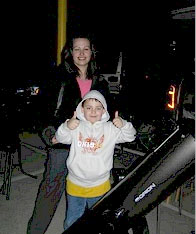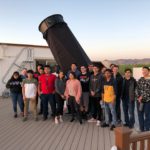Educational Resources for Teachers
The TAAA provides educational experiences for people of all ages. Our mission is to share the joy and excitement of astronomy through observing, education, and fun. We do this through the following programs available to classroom teachers and not-for-profit organizations.
For additional Moon & astronomy activities, use the following links:
Night Sky Network Moon Activities
Night Sky Network Astronomy Activities
Community Star Parties

Our members volunteer their time and telescopes for star parties throughout the Tucson area. Each year, we reach approximately 10,000 people through our Community Star Party Program. These star parties are typically held for school groups but any not-for-profit organization may request a star party. There is no charge for this service, but donations are always appreciated.
We need at least 6 weeks notice. Events are scheduled on a first come basis. Due to the high demand, we recommend this community service be grades 3, or age 8, and up. Since we depend on volunteers for this program, we can only accommodate a limited number of events per month, so make your request early. A year’s notice is not uncommon. Learn more about requesting a school star party through our School Star Party Schedule Coordinator or complete the request form below:
Bernie Stinger
Email: astronomy-events [at] tucsonastronomy.org
Star Party Request Form
Plan Your Star Party Event
Night Sky Network Outreach Toolkits
The TAAA is a charter member of NASA’s Night Sky Network which supports amateur astronomy clubs with their outreach programs. Under contract with NASA, the Astronomical Society of the Pacific has developed a series of Night Sky Network Toolkits that amateur astronomers can use at star parties. Kits consist of several hands-on activities centered on a particular theme. Most kits are best suited for small groups. The majority of the projects are meant for grades 4 and up through adults. They are primarily meant for lighted, indoor venues and require a table and two chairs.
There is no cost for these activities, but donations to cover material expenses are greatly appreciated. To request a toolkit at your star party, or another event, complete the event request form and select the desired Toolkit Name in the Night Sky Network (NSN) Toolkit dropdown menu. To learn more about the Night Sky Network toolkits, contact:
Terri Lappin
Email: smsig[at]tucsonastronomy.org
Night Sky Network Toolkits
- Space Rocks: Meteors, Meteorites, Asteroids, & Impact Craters
- Planet Quest: Explains planet detection techniques
- Our Galaxy, Our Universe: Scale model of the Milky Way galaxy and the Universe
- Black Hole Survival Kit: Explains gravity and black holes
- Telescopes – Eyes on the Universe: Explains basic principles of optics, the human eye, and observing
- Shadows and Silhouettes: Lunar phases, eclipses, and transits
- Exploring the Solar System: Scale model of solar system and NASA exploration of planets
- Mirrors and Glass – An inside look at telescopes: How telescopes work
- Dark Skies Education Kit: Light pollution principles
- Supernova! Life cycle of massive stars, comparison to life cycle of sun-like stars
- Our Magnetic Sun: Explains the Sun’s magnetic field and how it interacts with the Earth’s magnetic field, sometimes producing auroras
- Life in the Universe – Are We Alone? Explains the importance of sunlight and water to life on Earth, how unusual some of the Earth’s lifeforms are, and where we might find simlar conditions in the solar system
- Solar Scope (DAYTIME ONLY): Provides a white light image of the sun suitable for small group viewing.
Materials For Classroom Use
The TAAA has a 12″ diameter Moon Globe available to K-12 teachers for use in their classroom while teaching about the moon. To borrow the globe, contact smsig[at]tucsonastronomy.org. A deposit is required which will be returned upon return of the globe in original condition.
TAAA Astronomy CAMP
TAAA has renewed its Astronomy Camp Program for High School and College students. This program involves hands on observations and study using the state of the art facilities at the TAAA dark site in Cochise County. The site and the TAAA volunteer hosts are made available to qualified groups. Teachers interested in sponsoring an incredible program under the dark skies of Southern Arizona at our very dark Chiricahua Astronomy complex should begin planning now. For more information go to the TAAA ASTRONOMY CAMP.
interested in sponsoring an incredible program under the dark skies of Southern Arizona at our very dark Chiricahua Astronomy complex should begin planning now. For more information go to the TAAA ASTRONOMY CAMP.
Additional School Projects and Resources

Are you a Project Astro School? This program partners astronomers and teachers for learning. Benefits include free instructional materials for teachers, in addition to one-on-one support from a trained astronomer. Visit the Astro Tucson website for additional information and resources. Project Astro is an educational outreach program of the National Optical Astronomy Observatory (NOAO).

Teach Astronomy on-line textbook.

Night Sky Network is a nationwide coalition of amateur astronomy clubs bringing the science, technology and inspiration of NASA’s missions to the general public.

NASA Space Place is a source for hands-on activity guides, games and projects. These are simple, NASA-mission-related, structured activities for group settings or for kids and parents to do independently.

StarChild Learning Center for Young Astronomers: See “In the Classroom” link for resources and projects.

NASA Imagine the Universe: Site provides lesson plans and resources for students age 14 and up, and for anyone interested in learning about our universe. Includes lesson plans related to algebra II, high school physics and chemistry, as well as middle school mathematics in “The Teacher’s Corner.” Also see, Teacher Resources.

National Outstanding Young Astronomer Award: Would you like to recognize the outstanding achievements of a high school student in the United States? The Astronomical League offers annual awards to exceptional young astronomers.

